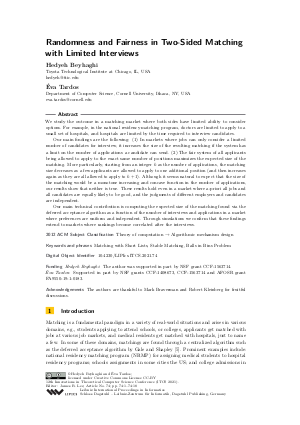Randomness and Fairness in Two-Sided Matching with Limited Interviews
Authors Hedyeh Beyhaghi, Éva Tardos
-
Part of:
Volume:
12th Innovations in Theoretical Computer Science Conference (ITCS 2021)
Part of: Series: Leibniz International Proceedings in Informatics (LIPIcs)
Part of: Conference: Innovations in Theoretical Computer Science Conference (ITCS) - License:
 Creative Commons Attribution 3.0 Unported license
Creative Commons Attribution 3.0 Unported license
- Publication Date: 2021-02-04
File

PDF
LIPIcs.ITCS.2021.74.pdf
- Filesize: 475 kB
- 18 pages
Document Identifiers
Subject Classification
ACM Subject Classification
- Theory of computation → Algorithmic mechanism design
Keywords
- Matching with Short Lists
- Stable Matching
- Balls in Bins Problem
Metrics
- Access Statistics
-
Total Accesses (updated on a weekly basis)
0Document
0Metadata
Abstract
We study the outcome in a matching market where both sides have limited ability to consider options. For example, in the national residency matching program, doctors are limited to apply to a small set of hospitals, and hospitals are limited by the time required to interview candidates. Our main findings are the following: (1) In markets where jobs can only consider a limited number of candidates for interview, it increases the size of the resulting matching if the system has a limit on the number of applications a candidate can send. (2) The fair system of all applicants being allowed to apply to the exact same number of positions maximizes the expected size of the matching. More particularly, starting from an integer k as the number of applications, the matching size decreases as a few applicants are allowed to apply to one additional position (and then increases again as they are all allowed to apply to k+1). Although it seems natural to expect that the size of the matching would be a monotone increasing and concave function in the number of applications, our results show that neither is true. These results hold even in a market where a-priori all jobs and all candidates are equally likely to be good, and the judgments of different employers and candidates are independent. Our main technical contribution is computing the expected size of the matching found via the deferred acceptance algorithm as a function of the number of interviews and applications in a market where preferences are uniform and independent. Through simulations we confirm that these findings extend to markets where rankings become correlated after the interviews.
Cite As Get BibTex
Hedyeh Beyhaghi and Éva Tardos. Randomness and Fairness in Two-Sided Matching with Limited Interviews. In 12th Innovations in Theoretical Computer Science Conference (ITCS 2021). Leibniz International Proceedings in Informatics (LIPIcs), Volume 185, pp. 74:1-74:18, Schloss Dagstuhl – Leibniz-Zentrum für Informatik (2021)
https://doi.org/10.4230/LIPIcs.ITCS.2021.74
BibTex
@InProceedings{beyhaghi_et_al:LIPIcs.ITCS.2021.74,
author = {Beyhaghi, Hedyeh and Tardos, \'{E}va},
title = {{Randomness and Fairness in Two-Sided Matching with Limited Interviews}},
booktitle = {12th Innovations in Theoretical Computer Science Conference (ITCS 2021)},
pages = {74:1--74:18},
series = {Leibniz International Proceedings in Informatics (LIPIcs)},
ISBN = {978-3-95977-177-1},
ISSN = {1868-8969},
year = {2021},
volume = {185},
editor = {Lee, James R.},
publisher = {Schloss Dagstuhl -- Leibniz-Zentrum f{\"u}r Informatik},
address = {Dagstuhl, Germany},
URL = {https://drops.dagstuhl.de/entities/document/10.4230/LIPIcs.ITCS.2021.74},
URN = {urn:nbn:de:0030-drops-136139},
doi = {10.4230/LIPIcs.ITCS.2021.74},
annote = {Keywords: Matching with Short Lists, Stable Matching, Balls in Bins Problem}
}
Author Details
Funding
- Beyhaghi, Hedyeh: The author was supported in part by NSF grant CCF-1563714.
- Tardos, Éva: Supported in part by NSF grants CCF-1408673, CCF-1563714 and AFOSR grant FA9550-19-1-0183.
Acknowledgements
The authors are thankful to Mark Braverman and Robert Kleinberg for fruitful discussions.
References
-
Nick Arnosti. Centralized clearinghouse design: A quantity-quality tradeoff. Working Paper, 2016.

-
Christopher Avery and Jonathan Levin. Early admissions at selective colleges. The American Economic Review, 100(5):2125-2156, 2010.

-
Hedyeh Beyhaghi, Daniela Saban, and Eva Tardos. Effect of selfish choices in deferred acceptance with short lists. Match-Up, 2017.

-
Joanna Drummond, Allan Borodin, and Kate Larson. Natural interviewing equilibria for stable matching. working paper, 2016.

-
D. Gale and L. S. Shapley. College Admissions and the Stability of Marriage. American Mathematical Monthly, 69(1):9-15, 1962.

-
Nicole Immorlica and Mohammad Mahdian. Marriage, honesty, and stability. In Proceedings of the Sixteenth Annual ACM-SIAM Symposium on Discrete Algorithms, pages 53-62 (electronic). ACM, New York, 2005.

-
Sangram Vilasrao Kadam. Interviewing in matching markets. Working Paper, 2015.

- Fuhito Kojima and Parag A. Pathak. Incentives and stability in large two-sided matching markets. American Economic Review, 99(3):608-27, 2009. URL: https://doi.org/10.1257/aer.99.3.608.
- Robin S Lee and Michael Schwarz. Interviewing in two-sided matching markets. Working Paper 14922, National Bureau of Economic Research, April 2009. URL: https://doi.org/10.3386/w14922.
-
Alvin E Roth and Marilda Sotomayor. Two-sided matching. Handbook of game theory with economic applications, 1:485-541, 1992.

